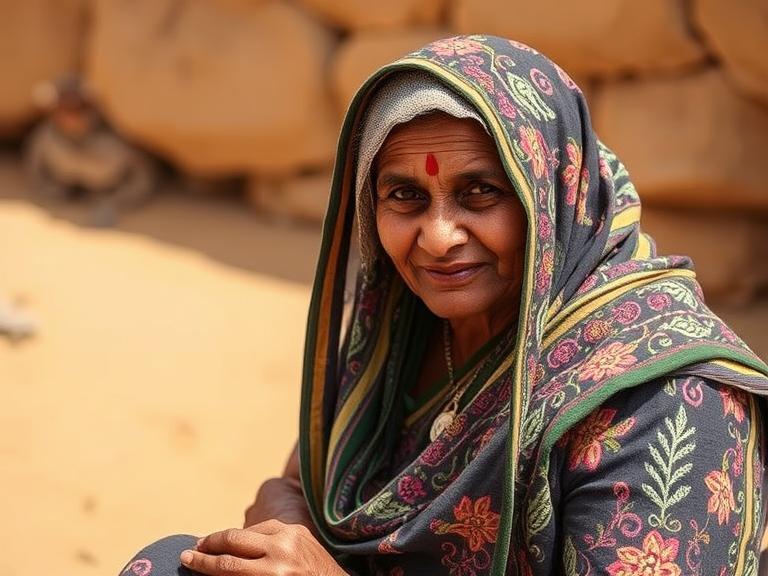Sonam
Share
Jewels of the Desert – The Art of Mirror Work Embroidery in Kutch

In the arid, color-soaked landscape of Kutch, Gujarat, something extraordinary glitters in the sunlight — not just sand, but embroidery. Tiny mirrors stitched into vibrant fabrics shimmer like jewels against the dry earth. And behind these sparkling pieces stands Bhuriben, a Kutchi artisan whose craft transforms everyday cloth into stories of celebration, identity, and spirit.
🧵 Threaded Traditions
Kutch is not only known for its vast salt deserts and camels but also for its world-renowned textile traditions. Among these, mirror work embroidery, or Abhla Bharat, holds a special place. The technique involves attaching small reflective mirrors to cloth using colorful silk threads in elaborate geometric and floral patterns.
For Bhuriben, this isn’t just craft — it’s memory. “I learned from my mother, who learned from her mother,” she says, fingers deftly weaving needle through cloth. “It was how women told their stories — with thread instead of words.”
Each community in Kutch, from the Rabaris to the Ahirs, has its unique motifs and color codes. In Bhuriben’s village, circular mirrors are considered auspicious, believed to ward off evil spirits. They’re stitched into wedding shawls, wall hangings, and even camel decorations.
🌞 Work Under the Sun, Shine Across the World
In Bhuriben’s small mud home, walls are adorned with embroidered panels — peacocks, paisleys, and sunbursts. She sits cross-legged near the window, surrounded by spools of colored thread and a pile of cotton cloth.
“The desert gives us little,” she says with a laugh, “but we give it color.”
On average, a medium-sized mirror work piece takes 15 to 20 days of painstaking work. Each mirror is attached with thread loops that hold it in place, then surrounded by decorative embroidery. The result is breathtaking — traditional yet contemporary, earthy yet dazzling.
🌍 A Global Appeal with Local Roots
With the help of artisan cooperatives and NGOs, Bhuriben’s work has now found admirers across India and abroad. Her embroidered bags, wall hangings, cushion covers, and blouses are sold in boutique stores and exhibitions under fair trade collectives.
“My embroidery traveled before I did,” she jokes, recalling the first time a buyer from France ordered ten wall hangings from her group.
Still, she stays rooted in her village, raising her grandchildren, cooking on a mud stove, and embroidering under the desert sun.
🧡 Empowering Women, Stitch by Stitch
What makes this art even more powerful is its social impact. Mirror embroidery is largely practiced by women, many of whom do it from home while managing families and farming.
“Embroidery gave me freedom,” says Bhuriben. “It helped me earn without leaving home.”
She now leads a group of 20 young women in her village, teaching them not only the technical skills but also the importance of quality, consistency, and storytelling. “Every mirror you stitch,” she tells them, “should reflect your pride.”
These groups are also creating awareness about fair wages, self-worth, and education — all through the lens of thread and tradition.
🔮 Innovation in Every Stitch
Today, mirror work is no longer limited to traditional garments. Young designers are pairing Bhuriben’s embroidery with denim, bags, and even wall tapestries with minimal modern aesthetics.
“It’s beautiful to see our work in new forms,” she says. “The world is changing, and so are we.”
Her daughter, Sunita, who holds a degree in textile design, now helps digitize designs and connects with online platforms that support artisans.
“This embroidery carries stories,” Sunita says. “And we want them heard around the world.”
🌱 Preserving the Sparkle of Culture
Bhuriben’s greatest dream is to open a small community museum — a place where village children can learn about their culture through the stitches of their elders.
“We are desert people,” she says. “But our hands know how to make rainbows.”
🛍️ Why It Matters
When you buy a mirror work item from artisans like Bhuriben, you’re not just getting embroidery. You’re carrying a piece of a desert village — its resilience, its colors, and its voice.
Each product holds:
- Generations of wisdom
- A woman’s empowerment journey
- A reflection — literally and spiritually — of heritage and hope
🌟 Final Thoughts
In every shimmering stitch, Bhuriben embroiders more than beauty. She embroiders defiance — against poverty, against cultural erosion, against invisibility. And she does it not with speeches, but with a humble needle, mirror, and thread.
Because in the vast quiet of the desert, her art speaks the loudest.
Related articles
The Loom of Legacy: Weaving Stories in Kanchipuram Silk
In the temple town of Kanchipuram, master weaver Raghavan keeps centuries of silk weaving tradition alive — crafting sarees that...
Stitched with Pride: The Mirror Work of Gujarat’s Rabari Women
In the deserts of Kutch, Gujarat, the Rabari women stitch more than fabric — they stitch identity, tradition, and soul....






